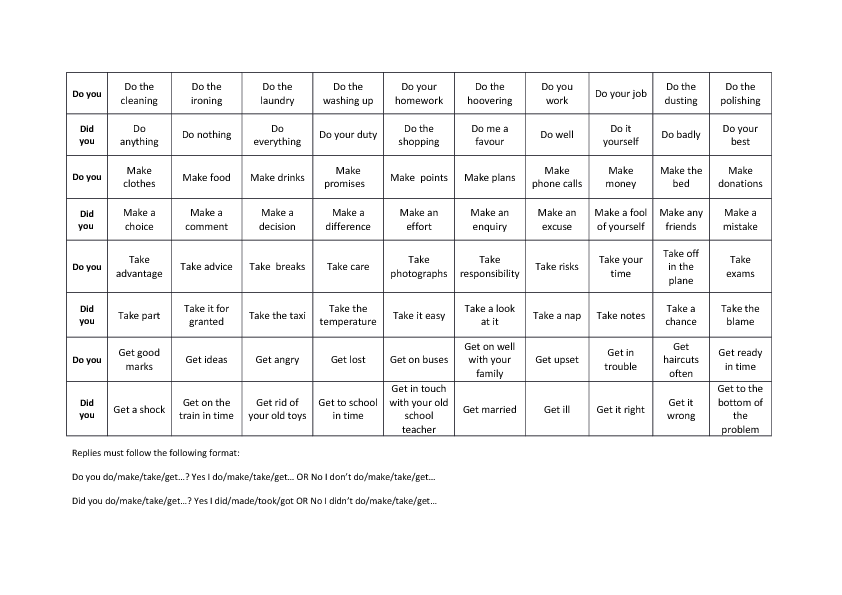This game works exactly the same as the other Battleships Questions Game - except that instead of practising 'Do you have/Have you got' question and answers, the students are practising present and past question and answer formats using 'do, make, take and get'. For example 'did you take care?' - 'Yes I TOOK care'/'No I didn't TAKE care'. Or 'Do you often get your hair cut?' 'Yes I often get my hair cut' etc. Therefore the shorter answers 'Yes I did' would not be acceptable in this game, as they are in the other game. The purpose of the game is also to build familiarity with do/make/take/get expressions - therefore these may need to be explained either prior to playing or during the game, to make sure that the students get the most out of playing it.
Instructions: Put students in pairs and give each a copy of the worksheet. They need to keep their sheets hidden from each other so the other partner can't see what they have written in their sheet. First, they choose where to draw their own 'battleships' (based on the original 'Battleships' game). Do this by drawing a line around boxes in a line going horizontally or vertically. Usually 5 battleships with 3 of 4 boxes in length and 2 of 3 boxes in length is a good amount, although you can tailor this to how much time you have. The aim of the game is to guess where your opponent's battleships are. This is done by asking them the questions in the boxes and using the far left column to complete each question (i.e. do you/did you). Each answer must be a FULL answer, e.g. 'do you make clothes?' - 'Yes I make clothes'. I.e. 'Yes/No' is not acceptable. The idea of the game is to practice asking questions and answering in the correct format. You must answer in the affirmative (e.g. 'Yes I get good grades') if your battleship is on that box, and no (No I don't get good grades), if not. The ss must keep asking questions until they have located all their opponents battleships. Once they hit upon a box that their opponent answers yes to, they can 'tick' it in another colour, or indicate however they want. I find ticking and crossing boxes a good method.
Instructions: Put students in pairs and give each a copy of the worksheet. They need to keep their sheets hidden from each other so the other partner can't see what they have written in their sheet. First, they choose where to draw their own 'battleships' (based on the original 'Battleships' game). Do this by drawing a line around boxes in a line going horizontally or vertically. Usually 5 battleships with 3 of 4 boxes in length and 2 of 3 boxes in length is a good amount, although you can tailor this to how much time you have. The aim of the game is to guess where your opponent's battleships are. This is done by asking them the questions in the boxes and using the far left column to complete each question (i.e. do you/did you). Each answer must be a FULL answer, e.g. 'do you make clothes?' - 'Yes I make clothes'. I.e. 'Yes/No' is not acceptable. The idea of the game is to practice asking questions and answering in the correct format. You must answer in the affirmative (e.g. 'Yes I get good grades') if your battleship is on that box, and no (No I don't get good grades), if not. The ss must keep asking questions until they have located all their opponents battleships. Once they hit upon a box that their opponent answers yes to, they can 'tick' it in another colour, or indicate however they want. I find ticking and crossing boxes a good method.
